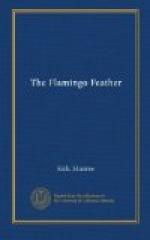“This is thy doing,” he said to Chitta, who was regarding in bitter silence this departure of his people, towards whom he still felt drawn by old association in spite of what he had so recently done and become. “This is thy doing, my young Seminole. Thou hast destroyed their store of food, and thus compelled them to go in search of more. Now let us follow them, and when we have seen them at a safe distance, we will bring my brave warriors to the attack of the white men shut up in yonder gopher hole.”
When the departing tribe was nearly out of sight down the river, the two Seminoles, drawing Chitta’s stolen canoe from its hiding-place, started in pursuit. They so arranged their own movements that they ran no chance of discovery from those in advance of them, though they were never far behind. They carefully examined each camping-place of the moving tribe, to assure themselves that no person was left behind who might discover them, and they always placed their own little camp so that it should be entirely concealed from those whom they followed.
Cat-sha was much pleased to find that in thus following Micco’s tribe he was also journeying in the direction of his own band, who awaited him in the depths of the great swamp. He even meditated an attack upon his Indian foes as they travelled, with their women, children, and baggage, before leading his warriors back to Fort Caroline.
It was these two, then, whose traces had so puzzled Has-se as he and Rene de Veaux in turn followed them, and it was their canoe of which the two boys caught a fleeting glimpse in the great swamp.
“Look!” exclaimed Has-se, whose keen eye was the first to detect the vanishing canoe. “These are either my own people, whom we have thus overtaken, or those whom we know to be in close pursuit of them. Here is work for us, Ta-lah-lo-ko, or rather for me, for it is my duty to discover the meaning of this pursuit, and warn my people if danger is near them, while I am also bound to keep thee as far as possible from all harm.”
“Nonsense, Has-se! It is well for thee to keep me out of danger so long as thou keepest from it thyself; but since I have thrown my fortunes with thine, thy friends are my friends, thy enemies are my enemies, and thy safety or danger is mine to share with thee. So say no more of my safety, save as it concerns thine as well, but lead on as thou thinkest best, and I will follow thee as truly as though I were enlisted beneath thy banner. Not that I suppose you Indians have such things as banners, or understand their significance; but thou might well have them, and be none the worse for the having.”
Although Has-se made no reply to this brave speech, he accepted it as an evidence of true friendship, and gave Rene a grateful smile, which the latter understood to mean “Very well, Ta-lah-lo-ko, I accept thy offer of service as heartily as thou dost tender it.”




